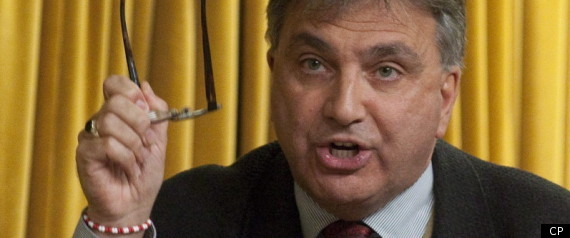An audio recording surfaced Friday showing the Conservative campaign in Guelph, Ont., wasn't the only one to use automated robocalls in the last federal election campaign: the Liberals also employed the technique.
Liberal MP Frank Valeriote has confirmed his campaign used an auto-dialed phone message to tell voters in the riding that the Conservative candidate, Marty Burke, opposed abortion. Valeriote said the call was recorded by a volunteer from his campaign who used a fake name because she feared retribution from anti-abortion activists.
The recording, provided by a Conservative supporter, features a woman who identifies herself as Laurie MacDonald, but doesn't say she's calling from Valeriote's campaign.
"The race in Guelph is very close," the woman says in the message. "Vote strategically on Monday to protect our hard-earned rights from the Conservatives and Marty’s extreme views."
A spokesman for Prime Minister Stephen Harper said the Valeriote campaign calls were illegal because they are supposed to identify which party made them.
Valeriote said the call was issue-based and not about suppressing votes. He added he spoke to Elections Canada about the call and the agency confirmed it complied with election law.
On Saturday, a spokesman for Elections Canada wouldn't confirm whether the agency had spoken to Valeriote, but pointed to the laws on election advertising that say candidates or anyone acting on their behalf has to mention in the message that the ad is authorized by the campaign.
Automated calls, also known as robocalls or direct voice drop, are a commonly used campaign tool because they are an inexpensive way to let candidates reach a large number of people.
Elections Canada is currently investigating robocalls in Guelph that falsely claimed to be on behalf of Elections Canada and that tried to direct people to the wrong polling station. Both are against the law.
Original Article
Source: Huff
Author: cbc
Liberal MP Frank Valeriote has confirmed his campaign used an auto-dialed phone message to tell voters in the riding that the Conservative candidate, Marty Burke, opposed abortion. Valeriote said the call was recorded by a volunteer from his campaign who used a fake name because she feared retribution from anti-abortion activists.
The recording, provided by a Conservative supporter, features a woman who identifies herself as Laurie MacDonald, but doesn't say she's calling from Valeriote's campaign.
"The race in Guelph is very close," the woman says in the message. "Vote strategically on Monday to protect our hard-earned rights from the Conservatives and Marty’s extreme views."
A spokesman for Prime Minister Stephen Harper said the Valeriote campaign calls were illegal because they are supposed to identify which party made them.
Valeriote said the call was issue-based and not about suppressing votes. He added he spoke to Elections Canada about the call and the agency confirmed it complied with election law.
On Saturday, a spokesman for Elections Canada wouldn't confirm whether the agency had spoken to Valeriote, but pointed to the laws on election advertising that say candidates or anyone acting on their behalf has to mention in the message that the ad is authorized by the campaign.
Automated calls, also known as robocalls or direct voice drop, are a commonly used campaign tool because they are an inexpensive way to let candidates reach a large number of people.
Elections Canada is currently investigating robocalls in Guelph that falsely claimed to be on behalf of Elections Canada and that tried to direct people to the wrong polling station. Both are against the law.
Original Article
Source: Huff
Author: cbc

No comments:
Post a Comment